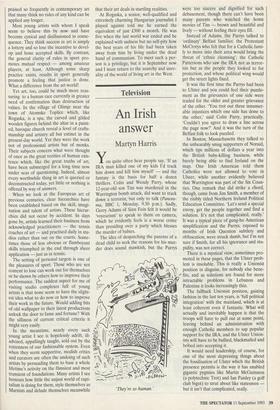Television
An Irish answer
Martyn Harris
You quite often hear people say, `If an IRA man killed one of my kids I'd track him down and kill him myself' — and the fantasy is the basis for half a dozen thrillers. Colin and Wendy Parry, whose 12-year-old son Tim was murdered in the Warrington bomb attack, did want to track down a terrorist, but only to talk (Panora- ma, BBC 1, Monday, 9.30 p.m.). Sadly, Gerry Adams of Sinn Fein felt it would be `voyeurism' to speak to them on camera, which he evidently feels is a worse crime than presiding over a party which blesses the murder of babies.
The idea of despatching the parents of a dead child to seek the reasons for his mur- der does sound mawkish, but the Parrys `They're so human.' were too sincere and dignified for such debasement, though there can't have been many parents who watched the home movies of Tim — brown and beautiful and lively — without feeling their eyes fill.
Instead of Adams, the Parrys talked to `ordinary' Belfast families: the Protestant McCrorys who felt that for a Catholic fami- ly to move into their area would bring the threat of `ethnic cleansing'; the Catholic Pattersons who saw the IRA not as terror- ists but as the people they looked to for protection, and whose political wing would get the street lights fixed.
It was the first time the Parrys had been to Ulster and you could feel their puzzle- ment as the grievances of one side were traded for the older and greater grievance of the other. 'You trot out these innumer- able injustices which one side has done to the other,' said Colin Parry, practically. `Couldn't you agree to draw a line across the page now?' And it was the turn of the Belfast folk to look puzzled.
In Boston, Massachusetts they talked to the unbearably smug supporters of Noraid, which tips millions of dollars a year into the British baby-killing business, while barely being able to find Ireland on the map. One Irish American told them Catholics were not allowed to vote in Ulster, while another evidently believed that Warrington was part of the Six Coun- ties. One remark that did strike a chord, though, came from Jim Smith, a member of the risibly titled Northern Ireland Political Education Committee. `Let's send a special envoy, get the people together and find a solution. It's not that complicated, really.' It was a typical piece of gung-ho American simplification and the Parrys, exposed to months of Irish Question subtlety and obfuscation, were struck dumb, but I'm not sure if Smith, for all his ignorance and stu- pidity, was not correct.
There is a mystical view, sometimes pro- moted in these pages, that the Ulster prob- lem is insoluble. This is really a Unionist position in disguise, for nobody else bene- -9 fits, and as solutions are found for more intractable problems in Lebanon and Palestine it looks increasingly thin.
The fallback Unionist position, gaining fashion in the last ten years, is 'full political integration' with the mainland, which is at least coherent even if fantastic. What will actually and inevitably happen is that the troops will have to pull out at some point, leaving behind an administration with enough Catholic members to sap popular support for the IRA, and the Ulster Union- ists will have to be bullied, blackmailed and bribed into accepting it.
It would need leadership, of course, for one of the most depressing things about the fossilisation of Ulster which the British presence permits is the way it has enabled gigantic pygmies like Martin McGuinness (a polytechnic Trot) and Ian Paisley (a golf club bigot) to strut about like statesmen but it isn't that complicated, really.


















































 Previous page
Previous page